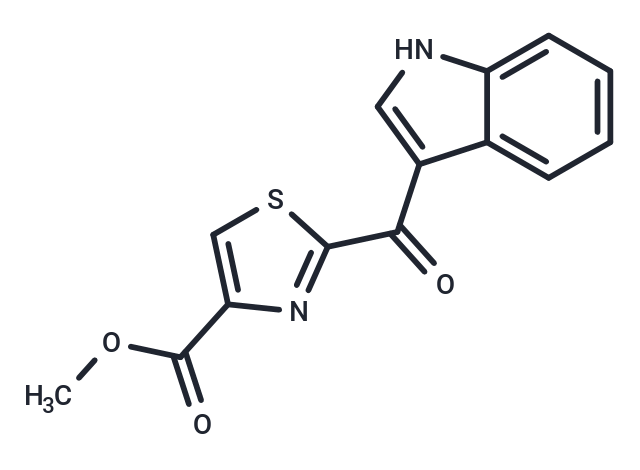Shopping Cart
- Remove All
 Your shopping cart is currently empty
Your shopping cart is currently empty

ITE is a potent endogenous agonist of the aryl hydrocarbon receptor (AhR) (Ki: 3 nM) with immunosuppressive activity.

| Pack Size | Price | Availability | Quantity |
|---|---|---|---|
| 2 mg | $34 | In Stock | |
| 5 mg | $55 | In Stock | |
| 10 mg | $97 | In Stock | |
| 25 mg | $178 | In Stock | |
| 50 mg | $313 | In Stock | |
| 100 mg | $497 | In Stock | |
| 1 mL x 10 mM (in DMSO) | $84 | In Stock |
| Description | ITE is a potent endogenous agonist of the aryl hydrocarbon receptor (AhR) (Ki: 3 nM) with immunosuppressive activity. |
| Targets&IC50 | AhR:3 nM (Ki) |
| In vitro | ITE dose- and time-dependently inhibited proliferation of HPAECs with a maximum inhibition of 83% at 20 μM after 6 days of treatment. ITE rapidly decreased AhR protein levels, while it increased mRNA levels of cytochrome P450 (CYP), family 1, member A1 (CYP1A1) and B1 (CYP1B1), indicating activation of the AhR/CYP1A1 and AhR/CYP1B1 pathways in HPAECs. The AhR siRNA significantly suppressed AhR protein expression, whereas it did not significantly alter ITE-inhibited growth of HPAECs[1]. |
| In vivo | ITE diminishes colitis pathology through induction of Tregs; reduces inflammatory cytokines, inflammation score, and macrophage frequency; and induces DCs resulting in amelioration of colitis. Therefore, nontoxic endogenous ITE promotes the induction of Tregs and may be useful for the treatment of IBD[2]. |
| Cell Research | Immunohistochemistry was performed to localize AhR expression in human lung tissues. The crystal violet method and MTT assay were used to determine ITE's effects on growth of HPAECs. The AhR activation in HPAECs was confirmed using Western blotting and RT-qPCR. The role of AhR in ITE-affected proliferation of HPAECs was assessed using siRNA knockdown method followed by the crystal violet method[1] |
| Animal Research | At the start of DSS induction, mice received 100 μl by intraperitoneal injection of vehicle and ITE (10 mg/kg body wt) twice a week on each Monday and Thursday until week 6 at the end point of the experiment. During a pilot study, we used several (5, 10, 20, 40, and 80 mg/kg body wt) doses of ITE and noticed that the 10-mg/kg dose was the lowest dose giving maximum protection. Therefore, Used this dose in entire study. At the experimental end point blood was collected by tail-vein bleedings and serum was obtained following centrifugation. For comparison, a similar treatment was also given to normal BL/6 mice to see the effect of ITE alone[2]. |
| Molecular Weight | 286.31 |
| Formula | C14H10N2O3S |
| Cas No. | 448906-42-1 |
| Smiles | COC(=O)c1csc(n1)C(=O)c1c[nH]c2ccccc12 |
| Relative Density. | 1.427g/cm3 |
| Storage | Powder: -20°C for 3 years | In solvent: -80°C for 1 year | Shipping with blue ice. | |||||||||||||||||||||||||||||||||||
| Solubility Information | DMSO: 41 mg/mL (143.2 mM), Sonication is recommended. | |||||||||||||||||||||||||||||||||||
Solution Preparation Table | ||||||||||||||||||||||||||||||||||||
DMSO
| ||||||||||||||||||||||||||||||||||||

Copyright © 2015-2025 TargetMol Chemicals Inc. All Rights Reserved.